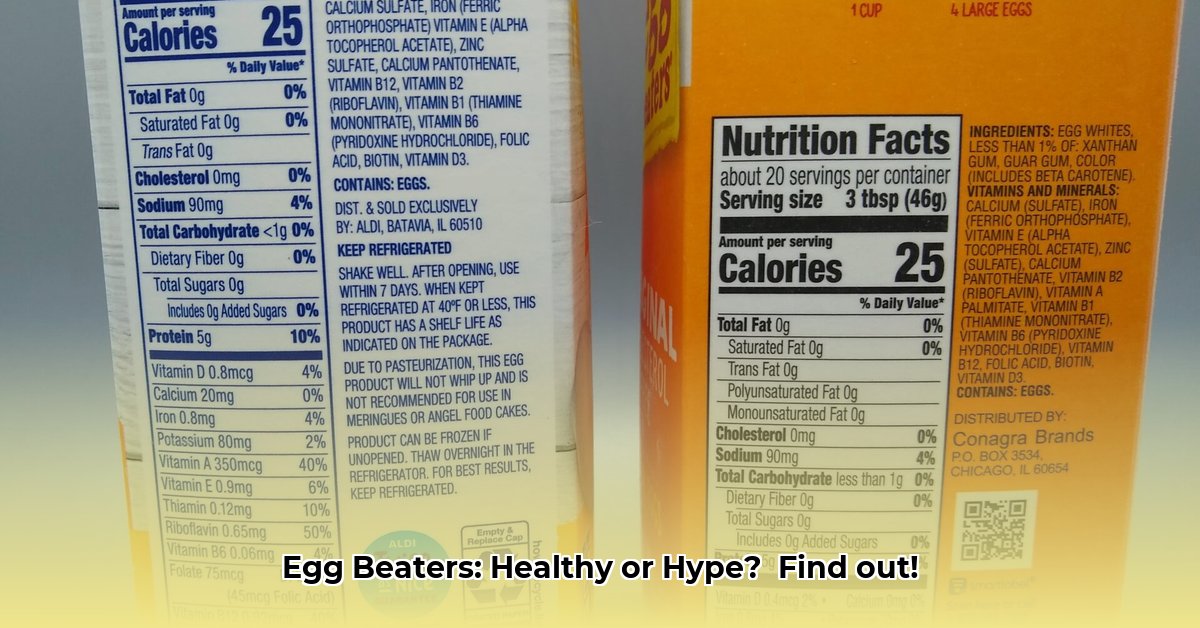Confused about Egg Beaters and their nutritional value? This guide provides a clear understanding of their composition, addressing conflicting information and offering practical advice for incorporating them into a healthy diet. We’ll explore the benefits and drawbacks, compare them to whole eggs, and provide guidance for various dietary needs, including weight management, vegetarian, and vegan diets. For more on eggshell membrane benefits, see this helpful article.
Egg Beaters Nutrition: A Detailed Insight
Let’s get right into understanding the ingredients in Egg Beaters and their nutritional profile. It’s more than just counting calories; it’s about understanding what nutrients you’re putting into your body, especially if you’re focused on diet management or finding the perfect healthy breakfast option. This in-depth insight will provide a balanced and objective overview.
The Challenges of Varying Nutritional Information
When researching Egg Beaters nutrition, you’ll quickly encounter inconsistencies in the data across different sources. This is often due to differences in testing methods between labs, minor recipe adjustments between production batches, and variations in stated serving sizes. To ensure you have the most reliable data, prioritize checking the nutritional information panel on the specific Egg Beaters carton you’re purchasing.
Let’s break down the key nutrients typically found in Egg Beaters:
- Protein Content: Expect approximately 5 grams of high-quality protein per serving, which is crucial for muscle maintenance, satiety, and overall health.
- Low-Fat Advantage: Egg Beaters are consistently very low in fat, making them a suitable option for individuals carefully managing their fat intake.
- Minimal Carbohydrates: The carbohydrate content is generally minimal.
- Sodium Variability: The sodium concentration can vary significantly between different Egg Beaters products. Always verify the sodium content on your specific carton, especially if you are watching your sodium intake.
- Vitamin and Mineral Information: The presence and quantity of added vitamins and minerals can vary between different varieties of Egg Beaters; the product label provides the most accurate specifics.
Interpreting the Nutritional Numbers: What’s the Real Significance?
Discrepancies in nutritional information may stem from production variations, diverse testing methodologies employed by different labs, or simple reporting errors. Increased transparency from the manufacturer, including more detailed explanations of their testing and quality control processes, could significantly reduce consumer confusion. Standardized, accurate data presented in a consistent format would greatly improve clarity for consumers. Consider this: Are inconsistent numbers due to manufacturing errors, or are there other factors at play like differences in how nutrients are measured?
A Practical Approach to Deciphering Egg Beaters Nutrition
Understanding Egg Beaters nutrition requires critical evaluation and careful comparison of available information. Here’s how to navigate these inconsistencies and make informed choices:
- Prioritize the Product Label: The nutritional information printed directly on your Egg Beaters carton provides the most accurate and up-to-date data for that specific product.
- Consider Serving Sizes: Pay close attention to the serving size listed on the label. Calorie and nutrient values are directly dependent on the amount you consume.
- Customize to Your Needs: Determine if Egg Beaters, with their specific nutrient profile, align with your individual dietary needs and health goals. Consider if supplementation is necessary to address any nutritional gaps, or evaluate whether regular whole eggs might be a better fit.
- Compare Across Brands and Varieties: If you have options available, compare nutritional profiles across different brands or different varieties of Egg Beaters. Take the time to check a few different options to find the best fit for your needs.
Comparative Table: Analyzing the Differences
This table highlights the variability in nutritional data from different sources. Note potential data fluctuations caused by testing differences, recipe changes and product formula modifications. This is for illustrative purposes only; always consult the label on your specific product.
| Nutrient | Source A | Source B | Source C | Source D | Source E |
|---|---|---|---|---|---|
| Calories (per serving) | 25 | 20 | 25 | 25 | 25 |
| Sodium (mg) | 75 | 90 | 115 | 90 | 80 |
| Protein (g) | 5 | 5 | 5 | 5 | 5 |
| Fat (g) | 0 | 0 | 0 | 0 | 0 |
Note: Data represents aggregated information from multiple sources for illustrative purposes. Always check the product label for the most accurate information.
The Conclusion: Be a Well-Informed Shopper
Don’t be discouraged by data inconsistencies! By carefully checking product labels, paying close attention to serving sizes, and thoroughly assessing your individual dietary needs, you can confidently determine if Egg Beaters are a good fit for your healthy eating habits. Continuous research and staying updated on product information may further clarify these details over time.
Reconciling Conflicting Egg Beaters Nutritional Information
Key Insights:
- Egg Beaters offer a convenient lower-calorie, lower-fat, and cholesterol-free alternative to whole eggs.
- Egg Beaters typically lack some of the valuable micronutrients found naturally in whole eggs, meaning you may need to strategically balance your diet with other nutrient-rich foods.
- Nutritional information surrounding Egg Beaters can sometimes vary across sources. Critical data evaluation and comparison are essential before incorporating them into your diet.
- Individual dietary needs, preferences, and health goals should ultimately determine whether whole eggs or Egg Beaters are a better fit for you.
Understanding the Variability in Egg Beaters Nutrition
Are you confused by the occasionally conflicting information surrounding Egg Beaters’ nutritional value? The discrepancy often stems from subtle measurement variations between labs, slight batch-to-batch variations during the production process, and potential minor ingredient adjustments over time. The key question becomes: Are these variations minor and insignificant, or are they substantial enough that you need to be concerned about these differences when making dietary choices?
Navigating the Nutritional Maze: A Systematic Approach
To navigate these potentially confusing figures, make sure to identify reputable and reliable sources of information first. Stick to established health organizations, government nutritional databases, or well-known and respected food and nutrition websites. Cross-reference information from multiple sources whenever possible, and always be acutely aware of the stated serving sizes when making comparisons. Consider: Are you comparing products on an equal footing, using the same serving size for each?
Egg Beaters vs. Whole Eggs: A Nutritional Showdown
Directly comparing Egg Beaters to whole eggs is essential to highlight the specific trade-offs involved in choosing one product over the other. Egg Beaters are primarily composed of egg whites that are often fortified with added vitamins and minerals. This formulation results in a significant reduction in calories, fat, and cholesterol compared to whole eggs. However, they also naturally lack some of the important micronutrients that are concentrated in the yolk of a whole egg. Whole eggs, on the other hand, offer a more complete and comprehensive nutrient profile but are also considerably higher in calories and fat.
| Nutrient | Egg Beaters (per serving) | Whole Egg (per serving) |
|---|---|---|
| Calories | \~25 | \~70 |
| Protein (g) | \~5 | \~6 |
| Fat (g) | \~0 | \~5 |
| Cholesterol (mg) | \~0 | \~186 |
| Vitamin D (mcg) | Varies, check label | \~1 |
| Vitamin B12 (mcg) | Varies, check label | \~0.5 |
Note: Values can vary slightly by brand, specific product variety, and serving size. Always consult the product label for the most accurate information.
Making Informed Choices for Your Diet
Ultimately, choosing between Egg Beaters and whole eggs depends primarily on your specific health goals, existing dietary needs, and personal preferences. If your primary focus is on calorie reduction, minimizing fat intake, and strictly managing cholesterol levels, then Egg Beaters are generally the better option. However, if you prioritize consuming a broader range of naturally occurring micronutrients and are not as concerned about calorie or fat content, whole eggs may be the preferable choice. You can also strategically combine both in your diet to capture the benefits of each.
Egg Beaters in Vegetarian & Vegan Diets: A Nutritional Overview
Key Insights:
- Egg Beaters are lower in calories, fats, and cholesterol than whole eggs, which can be appealing for some vegetarians.
- Egg Beaters generally do not have the same complete micronutrient profile as whole eggs, so dietary supplementation or careful food selection may be needed.
- Egg Beaters are not suitable for strict vegans because they fundamentally contain egg whites, which are an animal product. Additionally, some Egg Beaters products contain non-vegan Vitamin D3.
- Plant-based alternatives, such as tofu scrambles or other commercial egg replacers, are suitable for vegans looking for a cholesterol-free egg alternative.
- The choice between Egg Beaters (for some vegetarians) or vegan alternatives ultimately comes down to personal dietary priorities, ethical considerations, and specific nutritional needs.
Understanding the Nutritional Landscape for Specific Diets
How do Egg Beaters compare against whole eggs and plant-based alternatives, specifically for vegetarians and vegans? While Egg Beaters offer
- Microwave Safe Glass Containers for Durable Everyday Food Prep - January 21, 2026
- Borosilicate Glass Containers Offer Superior Food Storage and Meal Prep - January 20, 2026
- Glass Lid Storage Containers Keep Food Fresh and Safe - January 19, 2026










